Unit1What's the matter
人教版初二(下)英语unit1 what's the matter知识点讲解与练习

八年级下册英语Unit 1 what’s the matter?词汇篇学生通过本讲学习,能够掌握本单元的重点词汇句型,并在综合能力上有一定的拓展。
1.matter的用法(1)名词:事情,问题What’s the matter? =what’s wrong (with you)? =what’s the trouble怎么啦?出什么事啦?(2)动词:有重大影响,有重要性如:What does it matter?2.疾病的表达法have a cold/a fever/ a toothache/ a stomachache3.take 的固定搭配take one’s temperature/ take breaks/ take risks/take some medicine/take off/ take care of/take away 4.surprise的用法1.做名词:to one’s surprise 使。
惊讶的,出乎。
意料2.做动词:surprise sb使某人吃惊3.做形容词:surprising, surprised的用法5.get的用法get off下车/get on上车/get into陷入,参与6.be used to sth/doing sth 习惯于做某事be used to do sth 被用作去做某事used to do sth 习惯于做某事7.out of的固定搭配look out of 向。
外看/ get out of从。
出来/ run out of用光基础演练1.---What’s wrong ______you?---I fell off the bike and hurt my leg.A. ofB. withC. forD. by2.Tom and Jenny enjoyed _________playing computer games.A. himselfB. herselfC. ourselvesD. themselves3. Sally became interested ___________science and wanted to be a scientist.A. forB. inC. throughD. at4. ---I had a __________.---You’d better go to see a dentist.A. headacheB. feverC. coldD. toothache5. I didn’t _________my temperature, but I knew I had a fever.A. giveB. setC. takeD. show二、根据汉语意思翻译句子。
Unit1-what's-the-matter-教材语法解析
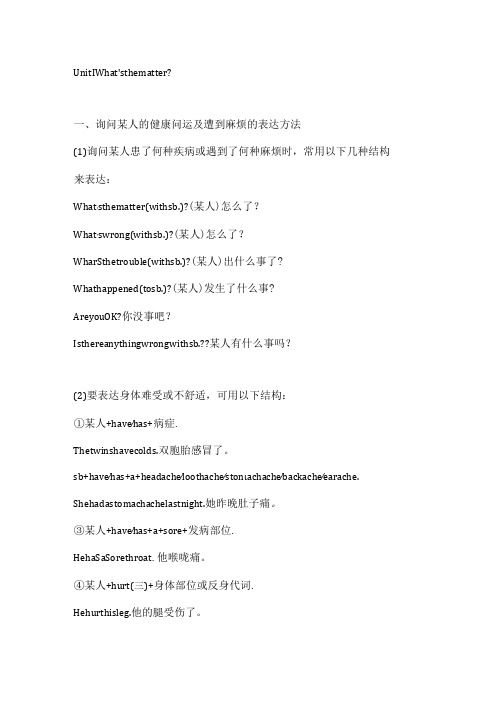
UnitIWhat'sthematter?一、询问某人的健康问运及遭到麻烦的表达方法(1)询问某人患了何种疾病或遇到了何种麻烦时,常用以下几种结构来表达:What,sthematter(withsb.)?(某人)怎么了?What,swrong(withsb.)?(某人)怎么了?WharSthetrouble(withsb.)?(某人)出什么事了?Whathappened(tosb.)?(某人)发生了什么事?AreyouOK?你没事吧?Isthereanythingwrongwithsb.??某人有什么事吗?(2)要表达身体难受或不舒适,可用以下结构:①某人+have∕has+病症.Thetwinshavecolds.双胞胎感冒了。
sb+have∕has+a+headache∕loothache∕stonιachache∕backache∕earache. Shehadastomachachelastnight.她昨晚肚子痛。
③某人+have∕has+a+sore+发病部位.HehaSaSorethroat.他喉咙痛。
④某人+hurt(三)+身体部位或反身代词.Hehurthisleg.他的腿受伤了。
⑤某部位+hurl(三).Myheadhurtsbadly.我头痛得厉害。
⑥某人+have∕has+apain+inone's+身体部位Ihaveapaininmychest.我胸口痛⑦(Thereis)soιnethingwrongwithone's+身体部位. Thereissomethingwrongwithmyrighteye.我的右眼有毛病。
⑧其他表达方式Shehasahearttrouble.她有心脏病。
Hegothitonthehead他头部受到了撞击。
Shecutherfinger.她割破手指了。
二、情态动词should的用法1.ShOIIld为情态动词,意为“应当:应当”,否定式为ShoUkIn'1,其后接动词原形,无人称和数的改变。
Unit1-what's-the-matter-教材语法解析
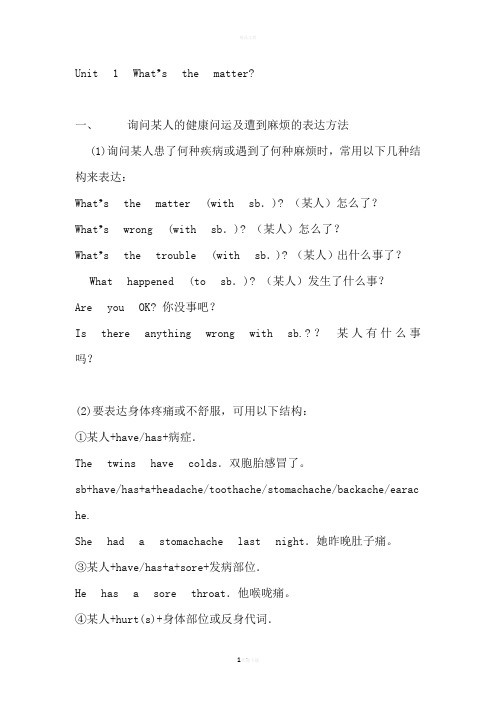
Unit1What’s the matter?一、询问某人的健康问运及遭到麻烦的表达方法(1)询问某人患了何种疾病或遇到了何种麻烦时,常用以下几种结构来表达:What’s the matter(with sb.)? (某人)怎么了?What’s wrong(with sb.)? (某人)怎么了?What’s the trouble(with sb.)? (某人)出什么事了?What happened(to sb.)? (某人)发生了什么事?Are you OK? 你没事吧?Is there anything wrong with sb.??某人有什么事吗?(2)要表达身体疼痛或不舒服,可用以下结构:①某人+have/has+病症.The twins have colds.双胞胎感冒了。
sb+have/has+a+headache/toothache/stomachache/backache/earac he.She had a stomachache last night.她昨晚肚子痛。
③某人+have/has+a+sore+发病部位.He has a sore throat.他喉咙痛。
④某人+hurt(s)+身体部位或反身代词.He hurt his leg.他的腿受伤了。
⑤某部位+hurt(s).My head hurts badly.我头痛得厉害。
⑥某人+have/has +a pain +in one’s+身体部位I have a pain in my chest.我胸口痛⑦(There is)something wrong with one’s+身体部位.There is something wrong with my right eye.我的右眼有毛病。
⑧其他表达方式She has a heart trouble.她有心脏病。
He got hit on the head他头部受到了撞击。
Unit_1_What_is_the_matter

Unit 1 What’s the matter?重点词汇1. matter n. 事情,问题,差错2. back n. 后背,背脊3. foot(pl. feet) n. 脚,足4. neck n. 脖子,颈部5. stomach n. 胃,胃部6. tooth n.牙齿 (pl. teeth)7. stomachache n. 胃痛,腹痛,肚子痛 8. sore adj. 疼痛的9. throat n. 喉头,喉咙 10. toothache n. 牙痛11. fever n. 发烧 12. lie (lay, lain) v. 躺,卧,平放在某处13. dentist n. 牙医 14. illness n. 疾病,生病 (adj. ill)15. advice n (u). 劝告,忠告,建议 16. thirsty adj.渴的,口渴的17. balance n. 平衡;协调 (adj. balanced) 18. beef n(u). 牛肉19. energy n.精力,活力,能力20.life n. 生命,人生 (pl. lives)21.diet n. 饮食,节食22.improve v. 改善,改良,提高23.headache n.头痛 24.important adj. 重要的,重大的25.stress n. 压力 (adj. stressed) 26.tradition n. 传统 (adj. traditional)27.medicine n.药 28.angry adj. 生气 (adv. angrily)重点词组及句型1. have a cold 患感冒2. (be) stressed out紧张的,有压力的3. get tired感觉疲惫4. stay healthy(keep healthy)保持健康5. at the moment (now) 此刻,现在6. on the other hand 另一方面7. get a cold患感冒 8. see a dentist 看牙医9. have a sore throat 嗓子痛10. have a fever发烧,发热11. have a toothache 牙痛12. have a sore back 背痛13. have a headache 头痛 14. a few 有些,几个,少数15. balanced diet均衡的饮食16. for example 例如17. What’s the matter? 怎么了?18. I have a headache. 我头疼。
Unit1 What's the matter 短语总结-背诵版

Unit1What's the matter?短语总结—背诵版一、短语总结1.“(某人)怎么了?”表达(3+2+1+1)1.What’s the matter/trouble/problems(with sb.)?2.What’s wrong/up(with sb.)?3.(Is there)anything wrong(with sb.)?4.What happened to sb.?2.happen(意外地)发生(happen-happened-happened)1.take place(有计划地)发生2.take one’s place=take the place of sb.取代/代替某人的位置3.sth.happen(ed)to sb.某事发生在某人身上4.sb.happen(ed)to do sth.某人碰巧做某事3.“身体部位疼痛or不舒服”的表达(4)1.have a+疾病名词(headache/stomachache/toothache/其他疾病)2.have a sore+身体部位3.身体部位+hurt(s)4.have a pain in the+身体部位4.accident1.accidental adj.意外的accidentally adv.意外地2.by accident=accidentally意外地3.by mistake错误地5.lie1.lie in位于......(内部)2.lie to位于......(相隔海/省)3.lie on位于......(接壤)4.Iie ylie躺;位于lie-lay-lain lying lie down躺下lie on/in/to位于撒谎lie-lied-lied lie to sb.对某人撒谎lie about sth.对某事撒谎lay放置;下蛋lay-laid-laid laying lay down放下6.上下车1.get on/off+a/the bus/plane/train/metro/subway2.get in/into/out of+a/the taxi/car/van7.think v.思考;认为(think-thought-thought)1.think about思考;考虑2.think over=think about carefully仔细考虑3.think of认为;想起What do you think of...?=How do you like...?你认为...怎么样?4.think twice再三考虑;谨慎考虑8.surprise n./v.(surprise-surprised-surprised)1.to one’s surprise令某人吃惊的是2.in surprise=surprisingly吃惊地3.be surprised at对......感到吃惊4.be excited about对......感到激动5.be interested in对......感兴趣9.trouble n.麻烦(不可数)1.have trouble/problems/difficulty(in)doing sth.做某事有麻烦/问题/困难2.get into trouble陷入麻烦3.be in trouble在麻烦中10.fall v./n.(秋天)(fall-fell-fallen)1.fall behind sb.落后某人catch up with sb.赶上某人2.fall in love with sb./sth.爱上...../与......相爱3.fall down掉下4.fall over摔跤5.fall down from...=fall off...从......掉下6.fall asleep睡着11.run v.跑/经营(run-ran-run)1.run after...追赶...2.run away逃跑3.sb.run out of sth.某人用光/耗尽某物4.sth.run out某物花光/耗光5.run a shop/company/restaurant经营一家商店/公司/餐馆e n./v.使用(use-used-used)1.be useful=be of use有用的2.be useless=be of no use没有用的3.be used to(doing)sth.习惯于(做)某事4.be used to do sth.被用来做某事ed to do sth.过去常常做某事13.help n./v.帮助(help-helped-helped)1.help(sb.)to do sth.帮助某人做某事2.help sb.with sth.在某方面帮助某人3.can’t help doing sth.情不自禁/忍不住做某事4.help oneself to sth.自便/自取......(随便吃/喝......)5.with one’s help=with the help of sth.在某人的帮助下6.ask sb.for help=turn to sb.向某人寻求帮助14.own adj.自己的v.拥有(own-owned-owned)owner n.拥有者1.sb.own sth.=sb.be the owner of sth.某人拥有某物2.on one’s own=by oneself=alone独自地3.one’s own+n.(单/复)某人自己的......15.mean v.意思是/打算(mean-meant-meant)adj.刻薄的;吝啬的meaning n.意思;意义meaningful adj.有意义的meaningless无意义的1.mean to do sth.打算做某事2.mean doing sth.意味着做某事16.mind v.介意/在意(mind-minded-minded)n.决心;心智;思想;头脑1.make up one’s mind(to do sth.)下定决心(做某事)2.change one’s mind改变某人的主意3.keep......in mind记住......4.lose one’s mind失去理智;发疯5.in one’s mind=in one’s opinion=in one’s view在某人看来6.mind sb./one’s doing sth.介意某人做某事7.Never mind.(用于安慰)没关系;别担心;不要紧17.cut v.切割/砍(cut-cut-cut)1.cut up=cut...into pieces切碎2.cut off切掉3.cut down砍倒4.cut...in half对半切开18.keep v.保持;继续(keep-kept-kept)1.keep doing sth.保持做某事2.keep sb.doing sth.让某人保持做某事3.keep on doing sth.=go on doing sth.继续做某事4.keep/stop sb.from doing sth.阻止某人做某事19.risk(risk-risked-risked)1.be at risk=be in danger有危险的/在危险中2.take a risk=take risks冒险3.take the risk of sth.=be at the risk of sth.冒着......的风险4.risk doing sth.冒险做某事20.expect v.期待(expect-expected-expected)1.expect(sb.)to do sth.期待(某人)做某事2.expect that从句期待+宾语从句21.sick adj.生病的(定语、表语)ill adj.生病的(只作表语)1.sick-sicker-sickest ill-worse-worst2.be sick of sth.厌烦某事3.be tired of sth.厌倦某事22.breath n.呼吸breathe v.呼吸(breathe-breathed-breathed)1.breathe fresh air呼吸新鲜空气2.hold one’s breath屏住呼吸3.take a deep breath深呼吸4.be out of breath上气不接下气23.ready adj.准备好的1.get/be ready to do sth.准备好做某事2.get/be ready for sth.为......做好准备24.其他短语1.be in control of sth.控制/掌管/管理某事2.take one’s temperature量某人的体温3.take the medicine吃药take pills吃药片4.the rest of sth./sb.剩下的某物/某人5.right away=right now=at once立刻;立即;马上6.get out of...从......出来/离开......。
Unit_1_What's_the_matter
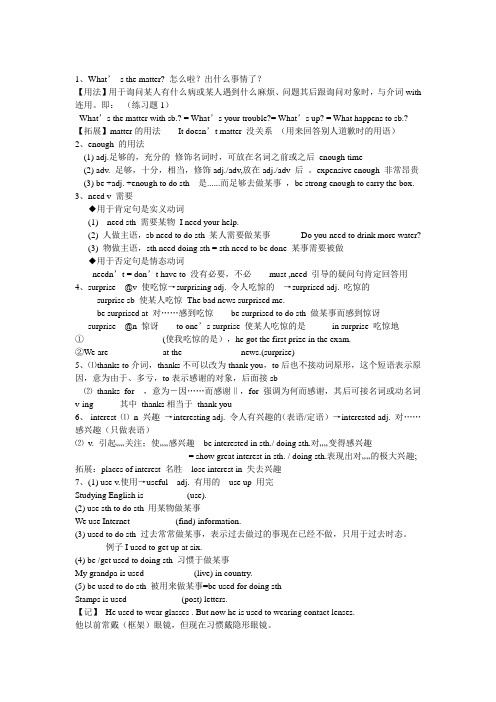
1、What’s the matter? 怎么啦?出什么事情了?【用法】用于询问某人有什么病或某人遇到什么麻烦、问题其后跟询问对象时,与介词with 连用。
即:(练习题1)What’s the matter with sb.? = What’s your trouble?= What’s up? = What happens to sb.? 【拓展】matter的用法It doesn’t matter 没关系(用来回答别人道歉时的用语)2、enough 的用法(1) adj.足够的,充分的修饰名词时,可放在名词之前或之后enough time(2) adv. 足够,十分,相当,修饰adj./adv,放在adj./adv 后。
expensive enough 非常昂贵(3) be +adj. +enough to do sth 是......而足够去做某事,be strong enough to carry the box.3、need v 需要◆用于肯定句是实义动词(1) need sth 需要某物I need your help.(2) 人做主语,sb need to do sth 某人需要做某事Do you need to drink more water?(3) 物做主语,sth need doing sth = sth need to be done 某事需要被做◆用于否定句是情态动词needn’t = don’t have to 没有必要,不必must ,need 引导的疑问句肯定回答用4、surprise @v 使吃惊→surprising adj. 令人吃惊的→surprised adj. 吃惊的surprise sb 使某人吃惊The bad news surprised me.be surprised at 对……感到吃惊be surprised to do sth 做某事而感到惊讶surprise @n 惊讶to one’s surprise 使某人吃惊的是in surprise 吃惊地①__________________(使我吃惊的是),he got the first prize in the exam.②We are ____________at the _____________news.(surprise)5、⑴thanks to介词,thanks不可以改为thank you,to后也不接动词原形,这个短语表示原因,意为由于、多亏,to表示感谢的对象,后面接sb⑵thanks for ,意为―因……而感谢‖,for强调为何而感谢,其后可接名词或动名词v-ing 其中thanks相当于thank you6、interest ⑴n 兴趣→interesting adj. 令人有兴趣的(表语/定语)→interested adj. 对……感兴趣(只做表语)⑵v. 引起……关注;使……感兴趣be interested in sth./ doing sth.对……变得感兴趣= show great interest in sth. / doing sth.表现出对……的极大兴趣; 拓展:places of interest 名胜lose interest in 失去兴趣7、(1) use v.使用→useful adj. 有用的use up 用完Studying English is__________(use).(2) use sth to do sth 用某物做某事We use Internet __________(find) information.(3)used to do sth 过去常常做某事,表示过去做过的事现在已经不做,只用于过去时态。
unit1_whats_the_matter课文重难点讲解

Unit1 What’s the matter?Section A1. What’ s the matter? 怎么啦?出什么事情了?【解析】matter/ ' mætə(r)) /n.问题;事情What’ s the matter with you?= What’s the trouble with you?= What’ s wrong with you?你怎么了?【注】:matter 和trouble 为名词,其前可加the 或形容词性物主代词,wrong 是adj. 不能加the【2013自贡3】18. —What’s the matter ______ Tom. He is wet through. —His car ran _______ the river.A.with; inB.to; intoC.with; into【用法】用于询问某人有什么病或某人遇到什么麻烦、问题其后跟询问对象时,与介词with连用。
即:What’s the matter with sb.? = What’s your trouble?= What’s up? = What happens to sb.?—What’s the matter with you —I have a bad cold. ( ) ①What’s ____ with you?A. troubleB. the matterC. the wrongD. matter ( )②—______? —Nothing serious , but a bit tired.—Better have a rest now, dear.A. Is that allB. Is there anything elseC. What’s thisD. What’s the matter with you 【2013湖北孝感】—_________?I have a headache and I don’t feel like eating anything.A. How are youB. What can I do for youC. What’s the matter with youD. How do you like it 【2011.云南昆明】27. —What’s the matter with Tina? —_______________.A. She is away. B. She is cool.C. She has a sore throat. D. She should take some medicine【拓展】matter的用法(1) It doesn’t matter 没关系(用来回答别人道歉时的用语)( ) —I’m sorry to break your pen. —______A. That’s rightB.It doesn’t matterC. Thank you3. —Please don't throw paper on the ground. —____,I won't.A. Excuse meB. That's all rightC. SorryD. It doesn't matter17.-I have a pain in my back.-_____ . You’d better see a doctor.A. I’m sorry to hear that B. Nothing serious C. It doesn’t matter39. —I’m very sorry. I broke your tea cup. —__________.A. It doesn’t matterB. You’d better notC. Take it easyD. It’s too bad 26.—Sorry, I'm late again.—______.A.That’s OK B.It doesn't matter C.Good idea (2) as a matter of fact= in fact 事实上, 实际上2. I have a cold 我感冒了I have a stomachache 我患胃痛I have a sore back. 我背痛。
unit1What's -the-matter-知识点及短语
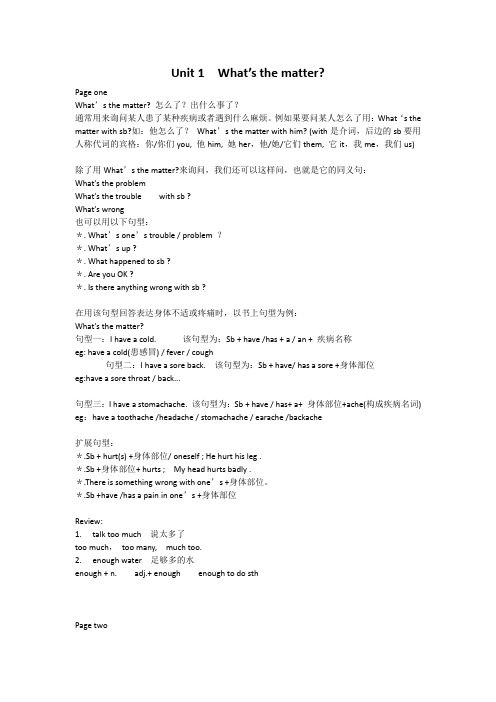
Unit 1 What’s the matter?Page oneWhat’s the matter? 怎么了?出什么事了?通常用来询问某人患了某种疾病或者遇到什么麻烦。
例如果要问某人怎么了用:What‘s the matter with sb?如:他怎么了?What’s the matter with him? (with是介词,后边的sb要用人称代词的宾格:你/你们you, 他him, 她her,他/她/它们them, 它it,我me,我们us)除了用What’s the matter?来询问,我们还可以这样问,也就是它的同义句:What’s the problemWhat’s the trouble with sb ?What’s wrong也可以用以下句型:*. What’s one’s trouble / problem ?*. What’s up ?*. What happened to sb ?*. Are you OK ?*. Is there anything wrong with sb ?在用该句型回答表达身体不适或疼痛时,以书上句型为例:What’s the matter?句型一:I have a cold. 该句型为:Sb + have /has + a / an + 疾病名称eg: have a cold(患感冒) / fever / cough句型二:I have a sore back. 该句型为:Sb + have/ has a sore +身体部位eg:have a sore throat / back...句型三:I have a stomachache. 该句型为:Sb + have / has+ a+ 身体部位+ache(构成疾病名词) eg:have a toothache /headache / stomachache / earache /backache扩展句型:*.Sb + hurt(s) +身体部位/ oneself ; He hurt his leg .*.Sb +身体部位+ hurts ; My head hurts badly .*.There is something wrong with one’s +身体部位。
unit1what's the matter单元知识总结
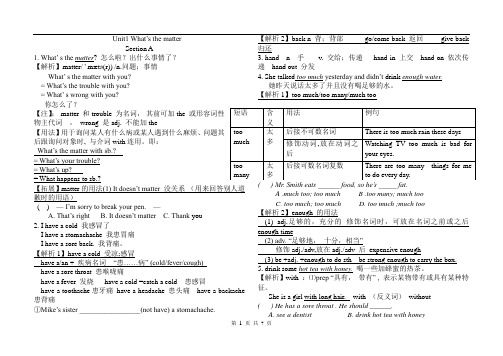
Unit1 What’s the matterSection A1. What’ s the matter? 怎么啦?出什么事情了?【解析】matter/ ' mætə(r)) /n.问题;事情What’ s the matter with you?= What’s the trouble with you?= What’ s wrong with you?你怎么了?【注】:matter 和trouble 为名词,其前可加the 或形容词性物主代词,wrong 是adj. 不能加the【用法】用于询问某人有什么病或某人遇到什么麻烦、问题其后跟询问对象时, 与介词with连用。
即:What’s the matter with sb.?= What’s your trouble?= What’s up?= What happens to sb.?【拓展】matter的用法(1) It doesn’t matter 没关系(用来回答别人道歉时的用语)( ) —I’m sorry to break your pen. —_______A. That’s rightB. It doesn’t matterC. Thank you2. I have a cold 我感冒了I have a stomachache 我患胃痛I have a sore back. 我背痛。
【解析1】have a cold 受凉;感冒have a/an + 疾病名词“患……病” (cold/fever/cough)have a sore throat 患喉咙痛have a fever 发烧have a cold =catch a cold 患感冒have a toothache患牙痛have a headache 患头痛have a backache 患背痛①Mike’s sister _________________(not have) a stomachache.【解析2】back n 背;背部go/come back 返回give back 归还3.hand n 手v. 交给;传递hand in 上交hand on 依次传递hand out 分发4. She talked too much yesterday and didn’t drink enough water.她昨天说话太多了并且没有喝足够的水。
Unit 1 What’s the matter? 课文讲解 知识点 练习
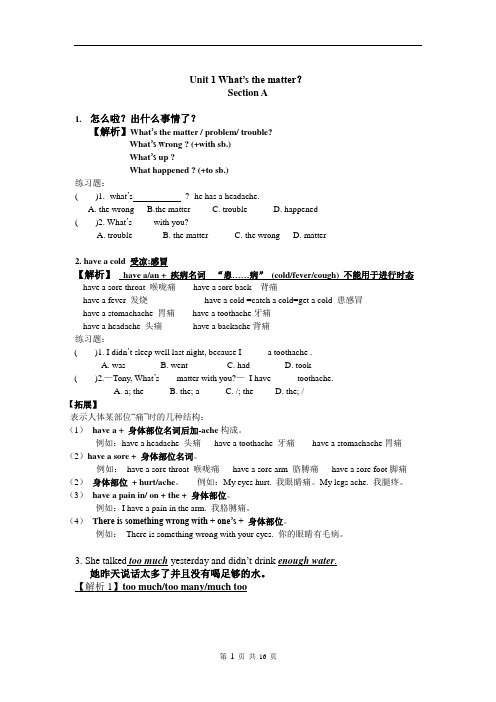
Unit 1 What’s the matter?Section A1.怎么啦?出什么事情了?【解析】What’s the matter / problem/ trouble?What’s w rong ? (+with sb.)What’s up ?What happened ? (+to sb.)练习题:( )1. -what’s ?- he has a headache.A. the wrongB.the matterC. troubleD. happened( )2. What’s ____ with you?A. troubleB. the matterC. the wrongD. matter2. have a cold 受凉;感冒【解析】have a/an + 疾病名词“患……病”(cold/fever/cough) 不能用于进行时态have a sore throat 喉咙痛have a sore back 背痛have a fever 发烧have a cold =catch a cold=get a cold 患感冒have a stomachache 胃痛have a toothache牙痛have a headache 头痛have a backache背痛练习题:( )1. I didn’t sleep well last night, because I _____ a toothache .A. wasB. wentC. hadD. took( )2.—Tony, What’s ___ matter with you?—I have _____ toothache.A. a; theB. the; aC. /; theD. the; /【拓展】表示人体某部位“痛”时的几种结构:(1)have a + 身体部位名词后加-ache构成。
例如:have a headache 头痛have a toothache 牙痛have a stomachache胃痛(2)have a sore + 身体部位名词。
Unit 1 What's the matter?

Unit1What's the matter?本单元单词:matter[ˈmætə(r)]n.问题;事情What's the matter?怎么了?出什么事了?sore[sɔ:(r)]adj.疼痛的;伤痛的have a cold感冒stomachache['stʌməkeɪk]n.胃痛;腹痛have a stomachache胃痛foot[fʊt]n.脚;足neck[nek]n.颈;脖子stomach[ˈstʌmək]n.胃;腹部throat[θrəʊt]n.咽喉;喉咙fever[ˈfi:və(r)]n.发烧lie[laɪ](lay[leɪ])v.躺;平躺lie down躺下rest[rest]v.&n.放松;休息cough[kɒf]n.&v.咳嗽X-ray[ˈeks reɪ]n.X射线;X光toothache[ˈtu:θeɪk]n.牙痛take one's tempreture量体温have a fever发烧break[breɪk]n.间歇;休息take breaks(take a break)休息hurt[hɜ:t](hurt[hɜ:t])使疼痛;受伤passenger[ˈpæsɪndʒə(r)]n.乘客;旅客off[ɒf]adv.&prep.离开(某处);不工作;从…去掉get off下车onto[ˈɒntu]prep.向;朝trouble[ˈtrʌbln.问题;苦恼hit[hɪt](hit[hɪt])(用手或器具)击;打right away立即;马上get into陷入;参与herself[hɜ:ˈself]pron.(she的反身代词)她自己bandage[ˈbændɪdʒ]n.绷带v.用绷带包扎press[pres]v.压;挤;按sick[sɪk]adj.生病的;有病的knee[ni:]n.膝盖;膝nosebleed[ˈnəʊzbli:d]n.鼻出血breathe[bri:ð]v.呼吸sunburned[ˈsʌnbɜ:nd]adj.晒伤的ourselves[,aʊəˈselvz]pron.(we的反身代词)我们自己climber[ˈklaɪmə(r)]n.登山者;攀登者be used to习惯于…;适应于…risk[rɪsk]n.&v.危险;风险;冒险take risks(take a risk)冒险accident[ˈæksɪdənt]n.交通事故kilo[ˈki:ləʊ](=kilogram)n.千克;公斤rock[rɒk]n.岩石run out of用尽;耗尽knife[naɪf]n.(pl.knives[naɪvz])刀cut off切除blood[blʌd]n.血mean[mi:n](meant[ment])v.意思是;打算;意欲get out of离开;从…出来importance[ɪmˈpɔ:tns]n.重要性;重要decision[dɪˈsɪʒn]n.抉择;决定control[kənˈtrəʊl]n.&v.限制;约素;管理be in control of掌管;管理spirit[ˈspɪrɪt]n.勇气;意志death[deθ]n.死亡give up放弃nurse[nɜ:s]n.护士Judy['dʒu:di]朱迪(女名)Nancy[ˈnænsi]南希(女名)Mandy['mændɪ]曼迪(女名)Aron['erən]Ralston['rɔ:lstən]阿伦·罗尔斯顿Utah['ju:ta:]犹他州(美国)重点单词详解:1.matter n.问题;事情短语:what's the matter常用于询问某人患了何种疾病,遇到了什么困难、烦恼或周边出了什么状况等该句型也可用于询问某物出了什么故障,其后可接with sb./sth.表示“某人/某物怎么了?”。
Unit1what’sthematter_SectionA知识点梳理人教版八年级英语下册

人教版八年级下册英语课本知识点梳理Unit 1 wh at’s the matter? sectionA课文内容:What's the matter? 怎么了? (教材第1页)【用法详解】What's the matter? 怎么了?/出什么事了?常用于询问某人患了何种疾病,遇到了什么困难等,也可用于询问某物出了什么故障,其后可接with sb./sth.,表示“某人/某物怎么了?”。
其中matter 用作名词,意为“问题;事情”matter前须加定冠词the。
【例句】What's the matter? 怎么了?Bad luck.I lost my pen. 真倒霉,我弄丢了钢笔.What's the matter with him? 他怎么了?He has a sore back.他背痛【拓展】matter[动词] 要紧;有关系多用在否定句、疑问句或条件句中It doesn't matter.没关系。
(通常用来回答对方的道歉)I have a cold. 我感冒了。
(教材第1页)【用法详解】have a cold (患)感冒。
其中have 用作及物动词,意为“患(病);遭受(病痛)”,常用于结构“have a/an +疾病名称”表示患病或身体某部位不舒服。
此时它不能用于进行时态,其第三人称单数形式为has,过去式为had。
常见的表示病痛的短语还有:have a fever 发烧have a toothache 牙疼have a headache头痛have a cough 咳嗽have a stomachache胃痛Do you often have a cold? 你经常感冒吗?Jim had a stomachache after supper yesterday.吉姆昨天晚饭后胃痛。
l have a stomachache.我胃痛。
( 教材第1 页)【用法详解】stomachache [名词]胃痛;腹痛是由“名词stomach(;腹部)+ache(疼痛)”构成的复合名词。
Unit 1 What’s the matter讲义(带答案)

Unit 1 What’s the matte r?讲义一、重点知识点梳理1. 怎么啦?出什么事情了?【解析】matter/ ' mætə(r)) /n.问题;事情【注】:matter 和trouble 为名词,其前可加the 或形容词性物主代词,wrong 是adj. 不能加the 【同义】遇到麻烦2. I had a cold.我感冒了。
have a cold=catch a cold=have the flu感冒have a fever 发烧have a cough咳嗽have a stomachache胃疼,肚子疼have a toothache牙疼have a headache头疼3. 身体部位+ ache(疼痛)构成新的复合词stomach+ache=stomachache head+ache=headache tooth+ache=toothache back+ache=backache 后背痛ear+ache=earache耳朵痛4. much too+ 形容词,意为太...... ,too much+名词,意为很多,大量。
5. enough【形容、副词】足够的/地,enough放在名前,形副后。
good enough足够好,enough money=much money6. lie down躺下,lie 躺,躺着,现在分词:lying过去式lay;lie说谎,过去式lied7. maybe“或许”,常用于句首,表示可能性,后加句子。
Maybe you are right.may be,是情态动词+be的结构,意为“可能,也许”,后加名词、代词或形容词。
He may be angry. sound like+名词代词和从句:It sounds like you don’t know the truth.It sounds like a good idea. sound+形容词,“听起来,好像”,The music sounds nice.9. need 需要,实义动词need+名词,需要某物;need to do sth.需要做某事,主语通常是人,表示人主动的动作:You need to listen carefully during class.need doing sth.主语通常是物,表示被动的动作:Your dirty clothes need washing.9.Run out &run out ofrun out 的主语一般是sth, 如:His money soon ran out. ran是run的过去式run out of的主语是sb. 如:he ran out of the money.10. I had a cold.我感冒了。
Unit1_What's_the_matter全单元

Conversation 4
Nurse: You look really tired. What’s the matter, Nancy?
Nancy: I didn't sleep well last night. I have a toothache. It's terrible! I can't really eat anything either. It hurts a lot.
Unit 1 What’s the matter?
Unit 1 What’s the matter? 一、重点短语 1. have a fever 发烧 2. have a cough 咳嗽 3. have a toothache 牙疼 4. talk too much 说得太多 5. drink enough water 喝足够的水 6. have a cold 受凉;感冒 7. have a stomachache 胃疼 8. have a sore back 背疼 9. have a sore throat 喉咙痛
Grammar Focus
在英语中,表达“疼痛或不舒服”时的常用结构: (1)主语+have/has+病症 (2)主语+have/has+a+sore+发病部位
sore 是一个独立的形容词,指的是身体某一部位的酸痛。如: sore back, sore throat,sore back,sore neck.
Section A 1a-2d
What is she doing? She is exercising. How often do you exercise? I exercise every day. Why do you exercise every day? I want to make my body stay healthy. How many parts of the body can
Unit 1 What's the matter(解析版)

Unit1 What's the matter?第一节:重点短语1.患感冒have a cold2.胃痛have a stomachache3.喉咙痛 have a sore throat4.背痛have a sore back5.躺下休息lie down and rest6.量体温take one’s temperature7.说得太多talk too much8.休息take breaks/a break9.下车get off10.拍X光片get an X-ray11.看见某人正在做.. see sb. doing12.反复考虑think twice13.期待某人去做某事expect sb. to do14.使…惊讶的to one’s surprise15.同意做某事agree to do sth.16.及时in time17.多亏,由于thanks to18.陷入困境;惹麻烦get into trouble19.休息几天rest for a few days20.把…放下;低下put…down21.告诉某人做某事tell sb. to do22.告诉某人不要去做tell sb. not to do 23.做某事有问题/麻烦/困难 have problems/trouble/difficulty (in) doing sth24.对…感兴趣be interested in25.习惯于做某事be used to doing sth26.过去常常做某事used to do sth27.冒险take risks/a risk28.由于/因为+n./pron. because of29.处于险境in a dangerous situation30.处于困境in a difficult situation31.用尽,耗光run out (of)32.准备/乐于做某事be ready to do33.切除cut off34.如此…以至于…so…that…35.以便于;为了so that/in order that36.离开;从..出来 get out of37.做决定make decisions/a decision38.掌控,管理be in control of 39….的重要性the importance of…40.放弃give up41.用绷带包扎put a bandage on…42.继续做某事keep on doing43.似乎/好像做某事seem to do随堂练习翻译下列句子1. --你怎么了?--我咳嗽嗓子疼。
unit1what's-the-matter课文重难点讲解
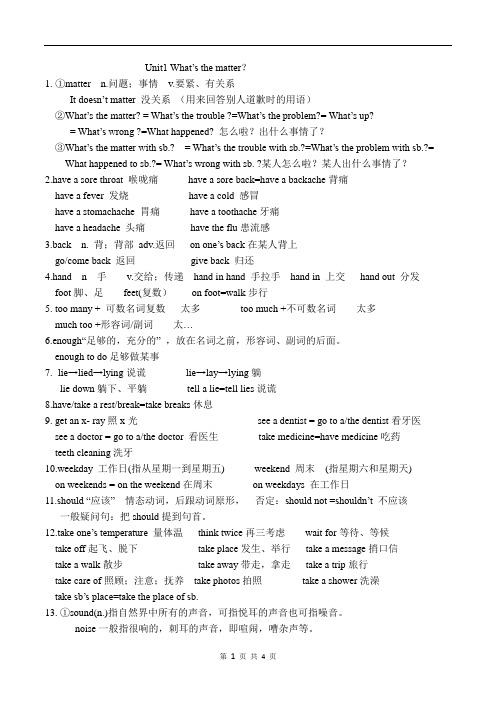
Unit1 What’s the matter?1.①matter n.问题;事情v.要紧、有关系It doesn’t matter 没关系(用来回答别人道歉时的用语)②What’s the matter? = What’s the trouble ?=What’s the problem?= What’s up?= What’s wrong ?=What happened? 怎么啦?出什么事情了?③What’s the matter with sb.? = What’s the trouble with sb.?=What’s the problem with sb.?=What happened to sb.?= What’s wrong with sb. ?某人怎么啦?某人出什么事情了?2.have a sore throat 喉咙痛have a sore back=have a backache背痛have a fever 发烧have a cold 感冒have a stomachache 胃痛have a toothache牙痛have a headache 头痛have the flu患流感3.back n. 背;背部adv.返回on one’s back在某人背上go/come back 返回give back 归还4.hand n 手v.交给;传递hand in hand 手拉手hand in 上交hand out 分发foot脚、足feet(复数)on foot=walk步行5. too many + 可数名词复数太多too much +不可数名词太多much too +形容词/副词太…6.enough“足够的,充分的”,放在名词之前,形容词、副词的后面。
enough to do足够做某事7.lie→lied→l ying说谎lie→lay→l ying躺lie down躺下、平躺tell a lie=tell lies说谎8.have/take a rest/break=take breaks休息9. get an x- ray照x光see a dentist = go to a/the dentist看牙医see a doctor = go to a/the doctor 看医生take medicine=have medicine吃药teeth cleaning洗牙10.weekday 工作日(指从星期一到星期五) weekend 周末(指星期六和星期天)on weekends = on the weekend在周末on weekdays 在工作日11.should “应该” 情态动词,后跟动词原形,否定:should not =shouldn’t 不应该一般疑问句:把should提到句首。
八下Unit 1 What's_the_matter?

Unit1 What’s the matter?
Language goals: Talk about your health problems and accidents;Give
advice.谈论健康问题,提意见。
should用作情态动词,后接动词原形,没有人称和数的变化。 should的否定形式为should not,通常缩写为shouldn’t。 should有以下几种常见用法: 1.用于提出建议劝告别人。例如:—Tom,I have a toothache.汤姆,我牙痛。—You should see a dentist.你应 当去看牙医。—I’m not feeling well these days.I hava bad cough.这些天我身体不适,老是咳嗽。—You shouldn’t smoke so much,think.我认为你不该抽这么多 烟。 2.用于第一人称疑问句中,用于征求对方意见。例 如:Should I help you wash clothes?要不要我帮你洗衣 服?Should I go there by bus?我是否应当坐公共汽车去那 里?
part of the body.
g m c K i ____arm ____back ____ear ____eye ____foot b f ____hand____head ____leg ____mouth a l h d j e ____neck ____nose ____stomach ____tooth
Grammar Focus
What's the matter?怎么了? matter n.“毛病、 麻烦事”,“What's the matter (with sb)? 句型。用来询问某人患了何种疾病。 what's the matter with him? He had a headache. matter v.意为"有关系;要紧"。通常用于否定句和疑问句,句中 常常含有what, who, where, if等词,一般以it作主语。例如: It doesn't matter if I miss the train, because there's another later. 我要是误了这趟火车也不要紧,因为晚些时候还有一趟车呢。 Does it matter a great deal to her whether they come or not? 他们 是否来,这与她有很大关系吗? no matter+特殊疑问词;意为"无论......",用来引导状语从句。 如: No matter where you go, please let me know. 无论你去哪里, 请告诉我一声。
- 1、下载文档前请自行甄别文档内容的完整性,平台不提供额外的编辑、内容补充、找答案等附加服务。
- 2、"仅部分预览"的文档,不可在线预览部分如存在完整性等问题,可反馈申请退款(可完整预览的文档不适用该条件!)。
- 3、如文档侵犯您的权益,请联系客服反馈,我们会尽快为您处理(人工客服工作时间:9:00-18:30)。
任务三:(5mins)复述课文
教师借助PPT展示以fill in the blanks 形式让学生进行课文复述
总结与作业布置 (3mins)
总结并布置学生课后完成一篇日记
大声朗读出令自己感悟最深的句型
通过小组讨论的形式完成重点单词的梳理。
对标题的分析可以让学生获得整体感知。
找出主题句有助于学生掌握文章的大意。
学生通过“记者”和“受访者”双重身份的扮演,可以激发他们阅读的欲望,避免了传统阅读教学中的老师问问题,学生找答案的被动局面。
读后的教学设计
任务一:(3mins)赞美人物,感悟内涵
以电子白板荧光笔的效果突出显出赞美的句子
任务二:(3mins)重点单词和短语
二、教学目标
本单元的话题是健康与急救,主要学习有关伤病及处理建议的表达方式。Section A侧重健康问题及提出相关建议,借此学习训练相关的语言结构。3a-3c是一个广泛的社会问题,在路上遇到别人有困难应不应该帮忙。教师要给学生进行正确的引导。本课时的重点是利用公交车司机救人的故事训练、发展学生的阅读技能,学习相关的语言表述,为后面的语法总结与学习提供更多的铺垫,并通过课堂讨论进行情感态度价值观的教育
首先通过歌曲《咱东北人都是活雷锋》为导入,活跃了学习氛围的。然后针对视频内容进行提问,让学生进行讨论,为下面的阅读做好铺垫。在阅读的过程中,设计了读前,读中,读后三个环节。每个环节都设置不同的任务。
为了避免阅读课中的枯燥,我采用了让学生以“记者”“采访者”的方式自设问题,和回答问题。在完成任务的过程中要学生注意自主和合作学习相互结合。然后通过,“我是老师”等练习让学生巩固短文的重点单词和短语。最后以“retell”的形式再现短文,考察学生的语言运用。在阅读教学中,常见的是老师的一问,学生一答,或是学生多答。所以本节课我尝试了让学生以“记者”“受访者”的身份自设问题,解决问题。避免了传统教学的老师眉毛胡子一把抓的问题。同时尝试运用了电子白板,以增加教学的趣味性和直观性。但是由于对学生的情况不是太了解和设计的活动比较开放,可能存在没有达到预期的教学效果。但是,一名合格的老师应该是要具备随机应变的机智来应对课堂的突发情况,这需要老师不断地充电学习和实践。本节课我把学生分成5个小组,每个小组最初的形象就是一张脸。学生要通过合作完成任务来跟他们的人物加上眉毛,眼睛,鼻子等。这也大大激发了他们的兴趣
任务二:找中心句。引导学生找出各段的中心句。
任务三:假设学生是来自CCTV的新闻记者,针对这个事迹,进行采访,提出问题。其他学生通过阅读回答“记者”问题。引导学生以新闻记者的身份提出问题,进行采访。问题的提出和回答不完整时,老师要提示其他学生补充
阅读标题并进行分析
学生自主找出中心句并发现其规律。
以“记者”的身份提出问题进行采访,又以“受访者”的身份来回答问题。整个活动中,既有自主学习又有小组合作。
三、学习者特征分析
八年级的学习英语的关键时期,这个阶段的学生活泼,好奇心和求知欲强。另外八年级学生的心理特点反映在学习的能力上,他们的模仿能力和记忆力也比较强。但是他们的记忆力以具体形象记忆为主,理解和分析语言能力上也比较弱。所以在教学中要多创设情境,利用图片,肢体语言和要给学生适时而恰当的鼓励。语言的学习过程是一种发现语言规则并创造性地运用这些规则的过程。所以教师在教学过程中要充分创设情境,为学生创设贴近教材内容的直观情景,设置不同的任务让学生进行操练,把生活中的交际场合带入课堂,使课堂变成一种具体的社会交往环境。让学生成为主角,把英语当成一种乐趣。
自主完成,并小组核对答案
课后查阅并完成
感受好佳句。荧光笔的效果增加了教学的趣味性,加深学生的印象。
“连线配对”而不是“翻译”降低了难度,增强学生自信心,在学习中收获喜悦感。
通过对课文的复述,加深对课文的理解,也提高了学生的口语水平。
总结本节课的内容,作业的布置有助于拓展学生的思维。
七、教学评价设计
本节课是一节阅读课。阅读是学习英语的重要一个环节,也是学生比较头疼的问题。所以我设计了视频导入新课,以激起学生的兴趣。
措施:教师要做好教学准备,使用正确的教学手段,做好教学环境和教学用具的准备与设计。学生也要做好学习的准备。
六、教学过程
教师活动
预设学生活动
设计意图
新课导入。用PPT展示一个视频《咱东北人都是活雷锋》(3m的视频,不仅活跃了课堂气氛还为学生接下来的阅读做好铺垫
读前教学设计(3mins)
1.用PPT展示问题,引导学生回答
2.利用课本截图跟PPT呈现插图,引导学生预测
在教师的引导下小组讨论回答问题。
对视频进行讨论,也是一种动态的阅读。
PPT展示的图片易于激活学生脑海中的图式,可以减轻阅读过程中带来的负担和障碍。增强学生自信心。
读中的教学设计20mins
任务一:标题分析引导学生仔细阅读课文标题
五、教学重点及难点
本节课是本单元的第三个课时,学生已经掌握一些有关健康,疾病的单词并能提出一些合理的建议,都是并不牢固。所以本节课的重点是以公交英勇司机救人的故事提高学生的阅读能力并运用语言目标进行交际。同时要引导学生讨论当今社会的议热话题,并给以正确引导。
措施:在复习上两节课的重点单词和句型后运用到实际的短文阅读,发展学生的阅读技能,学习相关的语言表述,为后面的语法总结与学习提供更多的铺垫,并通过课堂讨论进行情感态度价值观的教育。难点:通过上两节课的学习,学生已经有一定的知识储备,但是让他们在一节课的时间内提高阅读的能力,并运用语言技能有一定的难度。
四、教学策略选择与设计
兴趣和好奇是学习的动力。我在教学中设置了不同的游戏和活动,希望能最大地帮助和挖掘学生的学习潜力。英语教学提倡体验、实践、参与、 交流与合作的学习方式,所以在学习过程中要让学生以不同的渠道和方式去接触和学习英语。并且学习是一个循序渐进,由浅入深的过程,所以我设置了以上的教学思路。
课题名称:新目标八年级下Unit 1 What’s the matter? Section A 3a-3c
科目:
英 语
一、教学内容分析
本课时新目标八年级下册第一单元的第三个课时Section A侧重健康问题及提出相关建议,借此学习训练相关的语言结构。3a-3c是一关于以公交英勇司机救人的故事,所以本节课的重点是提高学生的阅读能力并运用语言目标进行交际。对于广泛的社会问题,学生已经掌握一些有关健康,疾病的单词并能提出一些合理的建议,但是并不牢固。同时要引导学生讨论当今社会的议热话题,并给以正确引导。
